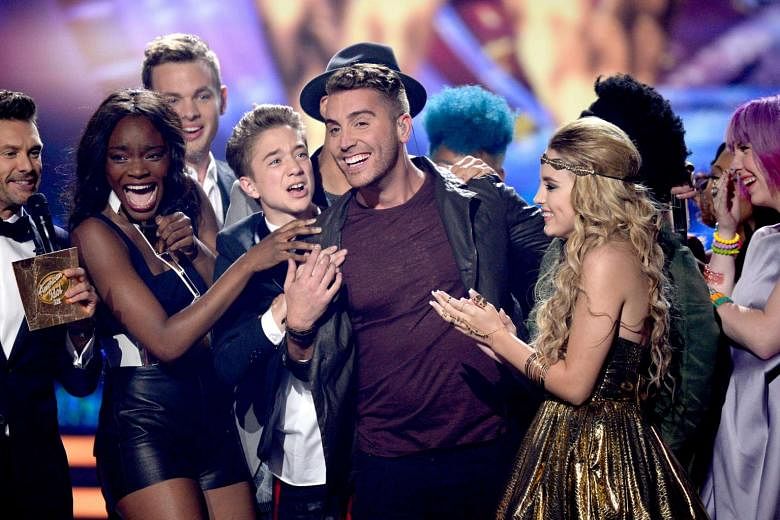NEW YORK • Dim the lights, cue the house band: It is finally time for American Idol to sing itself off.
That once-monumental music competition show begins its 15th and farewell season today with a premiere full of callbacks. Like so many of its ejectees, it is leaving the stage with one last swan song before the credits, at once lauded and bum-rushed.
The end of Idol marks the folding up of TV's last cultural big tent. The populace still reunites for the Oscars and the Super Bowl; there are still (relatively) big hits such as The Walking Dead and Empire. But none of them are what Idol was at its peak: a weekly destination for all ages and many tastes.
The series became an island of mainstream in a sea of niche by embodying contradictions. It grabbed a broad audience by bringing together singers from different pop subcultures - country versus bubble gum, R&B versus rock - and pitting them against one another in a battle of national preferences. It was simultaneously vicious and sentimental, a uniter and a divider. It changed the rules for making pop stardom.
Then social media changed those rules again, giving musicians an even more direct conduit to audiences than reality TV did and contributing to the show's eventual downfall.
American Idol arrived in the United States, having originated as Pop Idol in Britain, in the summer of 2002. This was the brash, early-aughts heyday of reality TV. The show's initial hook was judge/ producer/creator Simon Cowell, who styled himself as Satan in a black fitted T-shirt.
Cowell, flanked by co-hosts Randy Jackson and Paula Abdul, made the show a musical critique of Americans' belief in their personal exceptionalism. His lacerating put-downs were a slap against the culture of self-esteem, the can-do spirit, to quote a favourite of "Idol" singers, I Believe I Can Fly.
Believing, in Cowell's view, was not enough. A mediocre performance was "cabaret", or "something you'd hear on a cruise ship".
He was frank about the cynical needs of the pop industry and the cruel distinction between being good and being great - the difference between a singer and a star.
But the flip side, what may have helped give Idol broad appeal and longevity, was that it was also a shamelessly gushy celebration of talent. It built emotional narratives around its contestants and their struggles, and the weekly performances provided the soundtrack.
Idol pulled in north of 30 million viewers at its peak, and Fox milked it, expanding the excruciating audition rounds and padding the episodes. Celebrity guests flocked to pitch their wares.
It was the biggest thing on TV; at times, it practically seemed like the only thing on TV. Network competitors called the show "the Death Star".
But even Death Stars have their vulnerable exhaust ports. Familiarity was one. Cowell retired his baddie act in 2010 and the judges' panel went through an identity crisis. Ellen DeGeneres joined for Cowell's final year, but was too nice to be comfortable with judging.
The show fished for star power and cred with Jennifer Lopez and Steven Tyler.
In the 2013 season, the open tension between Mariah Carey and Nicki Minaj was America's best telenovela but a distraction from the contestants.
The ratings declined, gently at first, and the Idol pop-star spigot began trickling dust. The show stopped producing big new stars around the time that YouTube emerged as a musical force.
The problem for Idol was not so much that reality TV went away - it is still all over cable and the networks - but that "reality", the cultural force of authenticity and disintermediation, had dispersed into social media.
Curiously, Idol became a pretty good TV show again these last couple of seasons. It has moved beyond the Cowell-era idea that its singers are mere clay for judges to mould, casting more independent- minded performers.
The current panel of Lopez, Harry Connick Jr and Keith Urban is more craft-focused, offering musically detailed and specific critiques. It became a kind of classy, almost niche, music-nerd show (with diminished ratings to match).
But, by that point, it had grown too huge (and, like most ageing hits, too expensive) to shrink and survive.
American Idol defined itself by the standard of megastardom, which holds that once you make it big, the only answer is to swell bigger and bigger, like a balloon. Until, finally, you go pop.
NEW YORK TIMES
•American Idol 15th and farewell season premieres on StarWorld (Singtel mio TV Channel 301) tomorrow at 6pm

